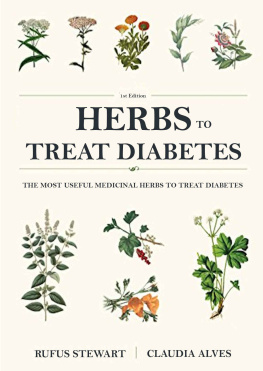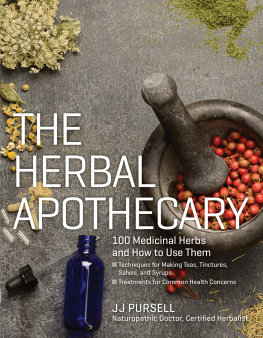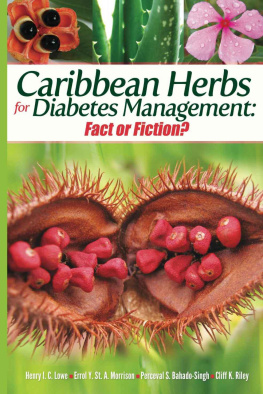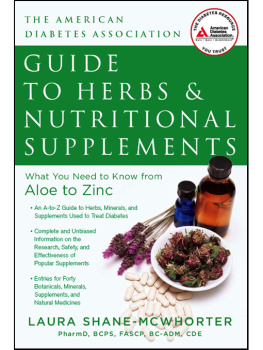Rufus Stewart - Herbs to treat diabetes: The most useful medicinal herbs to treat diabetes
Here you can read online Rufus Stewart - Herbs to treat diabetes: The most useful medicinal herbs to treat diabetes full text of the book (entire story) in english for free. Download pdf and epub, get meaning, cover and reviews about this ebook. year: 2021, genre: Romance novel. Description of the work, (preface) as well as reviews are available. Best literature library LitArk.com created for fans of good reading and offers a wide selection of genres:
Romance novel
Science fiction
Adventure
Detective
Science
History
Home and family
Prose
Art
Politics
Computer
Non-fiction
Religion
Business
Children
Humor
Choose a favorite category and find really read worthwhile books. Enjoy immersion in the world of imagination, feel the emotions of the characters or learn something new for yourself, make an fascinating discovery.
- Book:Herbs to treat diabetes: The most useful medicinal herbs to treat diabetes
- Author:
- Genre:
- Year:2021
- Rating:3 / 5
- Favourites:Add to favourites
- Your mark:
- 60
- 1
- 2
- 3
- 4
- 5
Herbs to treat diabetes: The most useful medicinal herbs to treat diabetes: summary, description and annotation
We offer to read an annotation, description, summary or preface (depends on what the author of the book "Herbs to treat diabetes: The most useful medicinal herbs to treat diabetes" wrote himself). If you haven't found the necessary information about the book — write in the comments, we will try to find it.
Herbs to treat diabetes: The most useful medicinal herbs to treat diabetes — read online for free the complete book (whole text) full work
Below is the text of the book, divided by pages. System saving the place of the last page read, allows you to conveniently read the book "Herbs to treat diabetes: The most useful medicinal herbs to treat diabetes" online for free, without having to search again every time where you left off. Put a bookmark, and you can go to the page where you finished reading at any time.
Font size:
Interval:
Bookmark:
Introduction
Today, the incidence of diabetes mellitus is one of the global medical and social problems in the healthcare system of the world. According to the International Diabetes Federation, the number of patients with diabetes mellitus in 2007 was 146 million, and by 2025 it will increase to 380 million, of which 90 % are patients with type 2 diabetes mellitus (DM 2).
However, with all the advances in the diagnosis and treatment of diabetes mellitus, the severity of the problem in the 21st century has not diminished, but, on the contrary, is increasing. According to the World Health Organization, there are currently more than 150 million people in the world suffering from this disease. According to experts, by 2016 this figure will increase to 250 million, and this trend will continue in the future. More than 10 million diabetes patients are officially registered in Russia . The importance of the problem is indicated by the fact that among the causes of death from somatic diseases, diabetes and its complications rank third after cardiovascular and oncological diseases.
The medical and social significance of diabetes mellitus is determined by the numerous severe complications of the disease, high disability and mortality. All this determines the unusually high economic costs of treating diabetes mellitus and complications, which are growing every year and make up from 7 to 13 % of healthcare in many countries of the world. Russia spends more than $ 160 million annually on the purchase of insulin, since there are still no sufficient capacities for the production of the active substance of human insulin in Russia. Against the background of the negative history of Russian insulin production, specialists remain wary of innovations in this area.
Today, state policy on diabetes mellitus is predominantly focused on improving medical care for patients and very little is being done to implement preventive and rehabilitative programs. The population does not have sufficient information about the danger of socially significant diseases, including diabetes mellitus.
According to the forecast of WHO experts, by 2030 more than 380 million people will suffer from diabetes in the world . Such a meteoric rise in morbidity is expected mainly due to an increase in the number of patients with type 2 diabetes, developing as a result of growing urbanization and related problems - unhealthy lifestyles, low physical activity, inadequate diet and stress.
Russia, along with India, China, the United States and Japan, is one of the five countries with the highest incidence of diabetes. Currently, about 3 million people with diabetes mellitus are officially registered in Russia . However, according to the data of control and epidemic studies, their number exceeds 8 million. In terms of the number of deaths in Russia, diabetes firmly holds the third place after cardiovascular and oncological diseases.
Unfortunately, despite the data of the 20-year UKPDS study, which showed that intensive therapy with type 2 diabetes led to a significant reduction in the risk of developing various complications and mortality, the problem of therapy and glycemic control of diabetes remains very relevant today throughout the world.
International diabetics organizations are now offering more stringent targeted glycemic control programs. In 2006, Russia adopted criteria for compensating for type 1 and type 2 diabetes, which are close to the indicators of carbohydrate metabolism in healthy individuals (algorithms for specialized medical care for patients with diabetes, Moscow, 2006).
Currently, a very wide arsenal of "hypoglycemic" drugs with various pharmacological and pharmacodynamic effects aimed at eliminating the main metabolic disorders leading to hyperglycemia (impaired insulin secretion, insulin resistance, excess glucose production by the liver, slowing glucose absorption in the small intestine) , stimulation (glucose-dependent) of insulin secretion and simultaneous suppression of glucose release).
When assessing the feasibility of methods of pharmacotherapy for metabolic syndrome, N. Yu. Kolgina and GA Bazanov (2008) found that beta-blockers and thiazide diuretics, widely used to treat hypertension, cause the progression of tissue insulin resistance.
Drugs used to treat type 2 diabetes are currently divided into several classes: insulins, sulfonylurea derivatives, biguanides, alpha-glucosidase inhibitors, PPA RJ agonists (thiazolidinediones), meglitinides (glinides, prandial glycemic regulators), peptide analogs of glucogone-like 1 , gliptins (DPP-IV inhibitors), amylin analogs, combined preparations.
Complex individually oriented therapy of diabetes mellitus allows to achieve compensation of metabolic disorders, prevents the progression of the disease and the development of complications. However, to a large extent, its success depends on the efforts of the patient himself, on the social and living conditions in which he lives, on the attitude of the people around him to him. Progress in the fight against this serious ailment cannot be achieved without efforts to develop a healthy lifestyle from childhood.
Many symptoms of the disease can be leveled or weakened if a patient with diabetes mellitus eats rationally, mindful of the diet and resorting to a wide range of herbal remedies. The patient can prepare some therapeutic and dietary products and dishes himself with certain advice and diet correction from an endocrinologist or phytotherapist.
According to economists, each ruble invested in prevention brings 8 rubles in savings. An expert council on preventive medicine has been established under the Health Protection Committee of the State Duma of the Russian Federation. A healthy lifestyle, proper nutrition and physical culture should be promoted as a tool to protect against all diseases. Herbal medicine can be of help in this complex and multifaceted work. Insufficient awareness of the population about the causes, prevention, treatment and consequences of diabetes is typical not only for Russia, but also for other countries of the world.
The threat of the diabetes epidemic dictates new strategies for the treatment and prevention of the disease. The main danger of type 2 diabetes is that for the time being it does not manifest itself in any way. Many patients have no symptoms of the disease. Only when the complications become irreversible and such a patient is admitted to the hospital with a heart attack or stroke, it turns out that he has been suffering from diabetes for a long time.
For phyto-dietary purposes, patients with type 1 and type 2 diabetes mellitus may benefit from such wild plants as nettle, dandelion, primrose, plantain, burdock, chicory, St. John's wort, calamus, horsetail, knotweed, cinquefoil, wheatgrass, panicle wormwood, elecampane, oregano, etc.
At the recent international symposium on wild plants and their practical use, including in medicine, held in Pushchino (Moscow Region), reports on the use of Jerusalem artichoke in the dietary recovery of patients with diabetes mellitus were of considerable interest. At present, thanks to the enthusiasm of Professor V.N.Zelenkov and his associates, numerous and rather tasty products containing Jerusalem artichoke roots have appeared on the table of patients.
To brighten up the taste of phyto-dietary products for patients with diabetes mellitus, you can recommend them dishes with the addition of apricots, viburnum, mountain ash, cranberries, black and red currants, thorns, quince, gooseberries, persimmons, lingonberries, sea buckthorn, blueberries, blueberries, rose hips, irgi, honeysuckle and etc.
Patients with diabetes mellitus benefit from birch sap, blended (mixed) with tincture of St. John's wort, lemongrass, zamaniha, centaury, infusion (decoction) of blueberries, lingonberries, chicory, rose hips, nettles, etc.
Next pageFont size:
Interval:
Bookmark:
Similar books «Herbs to treat diabetes: The most useful medicinal herbs to treat diabetes»
Look at similar books to Herbs to treat diabetes: The most useful medicinal herbs to treat diabetes. We have selected literature similar in name and meaning in the hope of providing readers with more options to find new, interesting, not yet read works.
Discussion, reviews of the book Herbs to treat diabetes: The most useful medicinal herbs to treat diabetes and just readers' own opinions. Leave your comments, write what you think about the work, its meaning or the main characters. Specify what exactly you liked and what you didn't like, and why you think so.















